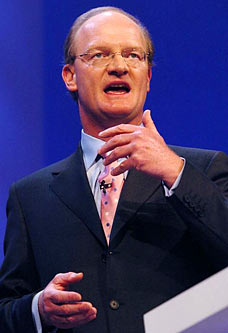By Michael Banks
After a few days of political horse-trading, a resignation speech from former UK prime minister Gordon Brown and the emergence of the first coalition government since the Second World War, the UK has a new science minister.
Last Thursday’s general election resulted in a hung parliament, meaning no party had an overall majority. After days of coalition talks between the three main parties, the Conservatives and the Liberal Democrats joined in a government, with David Cameron as prime minister.

Cameron spent most of yesterday announcing the members of his new cabinet and late last night it emerged that David Willetts, Conservative Member of Parliament for Havant, will be the minister of state for universities and science in the department for business, innovation and skills.
Nicknamed “two brains”, Willetts was shadow secretary of state for innovation, universities and skills from July 2007 and before that was shadow secretary of state for education from December 2005 to July 2007.
Like his predecessor Paul Drayson, who was science minister in the Labour government under Gordon Brown, Willetts will not be a cabinet minister, but will be attending cabinet meetings.
Willetts, however, takes over the role as science minister at a testing time for science funding in the UK. Following the deficit in the budget of the Science and Technology Facilities Council that resulted in the UK pulling out of 25 international projects in December, Drayson won plaudits for making structural changes to the STFC that will better protect the funding council from foreign currency fluctuations that affect its international subscriptions.
Willetts will now have to deal with the ramifications of the STFC’s changes and its continuing budget deficit as well as any budget cuts that could happen when the new coalition government announces its spending review, which is expected to happen in the autumn.
Previous statements by Willetts when he was shadow secretary of state for innovation, universities and skills indicate that he will fight to maintain the science budget from swingeing cuts. “It is important that science is funded properly. It should not be about the government picking winners; it should be about supporting academically excellent research centres,” Willetts said when the STFC’s budget problems first emerged in December 2007. “We will scrutinize these proposals to make sure they improve things after last year’s scandal when the government took £75 million from science by stealth.”
Willetts has also apparently said that he would like to delay the Research Excellence Framework (REF), which is used to allocate funding to individual universities. The REF replaces the Research Assessment Exercise and will include quantitative information like bibliometric data in addition to the existing peer-review evaluation.
The University and College Union (UCU) released a statement today welcoming the appointment of Willetts as science minister. “Mr Willets proved his ability to listen to staff concerns when committing to delay unpopular plans to make university research funding dependent on economic impact,”; says Sally Hunt, general secretary of the UCU. “The academic community made clear its view that assessing and funding research according to its impact is unworkable and we urge him to put an end to this sorry chapter once and for all.”
Hunt also warned that Willetts will need to “listen to the ever-widening consensus of opinion which opposes cuts in college and university budgets, caps on student numbers, the privatization of academic institutions and increases in the cost of a university education for hard-working families”.
The Campaign for Science and Engineering (CaSE) also welcomed Willetts appointment. “In his former roles as shadow secretary for education and then innovation, universities and skills, David Willetts always engaged with science issues,” says Hilary Leevers, acting director of CaSE. “It is vital that the minister for science works closely with the department for education. As former shadow of this department, Willetts will be well positioned to do this.”



